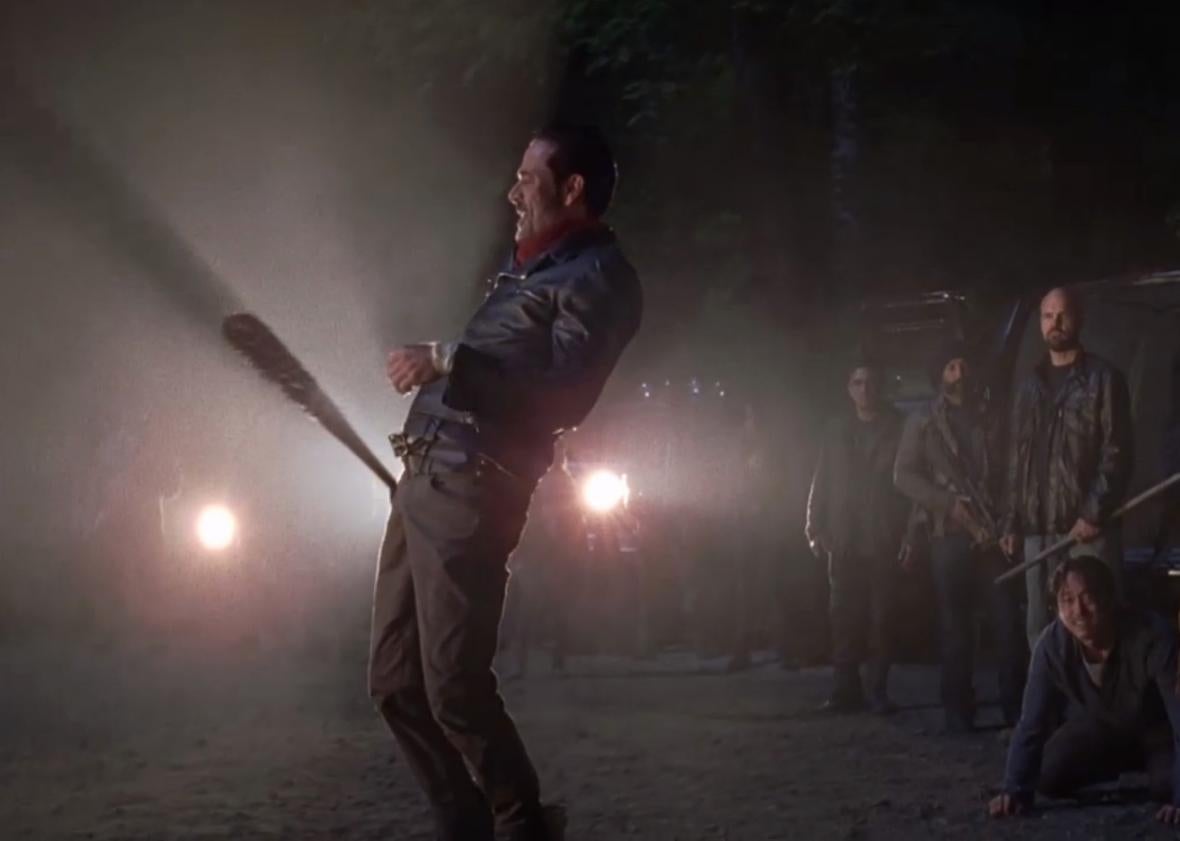Resolving a season-spanning cliffhanger and ending a full year of speculation, The Walking Dead revealed in last night’s Season 7 premiere, “The Day Will Come When You Won’t Be,” exactly whose head it was that Jeffrey Dean Morgan’s villain, Negan, crushed with a barbed wire–wrapped baseball bat. The answer, as it turned out, was twofold: First Michael Cudlitz’s Abraham went down, and then, with no advance warning, so did Steven Yeun’s Glenn, a fan favorite character who has been with the show since its first episode.
Abrupt death is nothing new to The Walking Dead. It’s essentially the fuel the show runs on, the ultimate demonstration of its guiding philosophy that in a world ruled by flesh-eating corpses, no one and nothing is ever truly safe. But even for a show that takes pride in dreaming up new ways to dismantle the human body, last night’s killings were remarkably gory—the bloodiest deaths in the show’s history and perhaps television’s as well. Negan didn’t just dispatch Glenn and Abraham with a single blow to the head; the ex-military badass Abraham survived long enough to spit his last defiant words in Negan’s face, and even though the first swing of Negan’s bat shattered Glenn’s skull and popped his left eye out of his socket, he held on long enough to whimper his pregnant wife’s name and to promise, “I’ll find you.” Then, Negan turned them both into pulp, smashing and smashing until all that was left was a pile of meat for zombies to pick at.
Fans of Robert Kirkman’s source comics had suspected this was coming since Morgan’s casting was announced last November. The comic book’s 100th issue climaxes with Glenn getting killed in much the same way, although the show took steps to throw them off the scent. First, it staged what seemed like Glenn’s death in the previous season and then revealed he was still alive, which made it seem like he had definitively joined the ranks of the show’s unkillable core characters. (The show’s “No one is safe” motto is undercut by a hit TV series’ need to hold onto its stars.) Then, it put Abraham’s death first, lulling comic-book fans into a false sense of security before Daryl tried to fight back and Negan decided Rick’s band of survivors needed a further lesson in submission.
But even those who suspected Glenn’s death was on the way wondered whether The Walking Dead would take things as far as Kirkman’s comic, which ends the sequence with a panel of Glenn’s dislocated eye sitting atop a pile of bone and meat. The killings were vicious and brutal, and, even for some fans of the show’s generally gory approach, more than they were willing to bear. To judge from social media, last night’s episode prompted an exodus of fans who’d given the show the benefit of the doubt and felt they’d not only been cheated but had their noses rubbed in it.
Some of the fans proclaiming they’re done with The Walking Dead will inevitably come back—as grotesque and manipulative as it’s become, the show still has an addictive grip—and those who don’t, frankly, won’t be missed; even with a slight dip in Season 6, the show boasted an audience of 18 million within the critical three-day window after a new episode, which is a powerful incentive for the show to keep doing exactly what it’s doing. But “The Day Will Come When You Won’t Be” makes it clear that the drive to provide more and greater shocks has overwhelmed the show’s always-tenuous commitment to story and character: The Walking Dead has become the dramatic equivalent of clickbait.
Glenn and Abraham’s deaths were shocking, all right, but they were distasteful, too, even on a show where bodies are regularly torn apart like wet paper. The episode went beyond depicting the gore to reveling in it, savoring the audience’s discomfort with as much sadistic pleasure as Negan himself. The ostensible point of all this brutality was to push The Walking Dead’s hero, Rick, past his breaking point, to crush his spirit to the point where he was ready to chop off his own son’s arm at Negan’s behest. Showrunner Scott M. Gimple feebly argued that stretching the cliffhanger over the gap between seasons was a dramatic decision rather than a marketing ploy, but the effect was to disconnect us from Negan’s victims, who appeared in the episode only as he saw them: as pieces of meat. Negan even took over the episode’s marketing; on Twitter, the Walking Dead hashtag was automatically embellished with an emoji baseball bat.
The Walking Dead’s use of second-semester nihilism as a pretext for titillating violence has long since grown tiresome, but Negan’s highly sexualized form of brutal domination strikes a particularly ugly chord in the midst of a presidential campaign where one candidate brags about the size of his genitalia, disparages his female opponent’s “stamina” (i.e., virility), and is accused of serial sexual assault. Negan brags about emasculating Rick, even likening Glenn and Abraham’s deaths to the twin snips of a castration, and after he splatters Abraham’s brains all over the clearing, he wags his blood-slickened bat in the fact of Abraham’s former lover, Rosita, the camera dropping to a low angle so the phallic symbolism is impossible to miss. (The men aren’t safe either: When one of his henchmen offers to kill Daryl, Negan leers, “You don’t kill that. Not until you try a little.”) It’s odd to think of a show like The Walking Dead as escapist, but its radically simplified moral universe is part of its appeal. There’s no trust in its world, no kindness, unless it’s exhibited by some soft-hearted fool who’s about to end up as walker chow. The nihilism is both rote and remote. It’s only when it accidentally jostles up against the real world that we’re reminded how truly ugly The Walking Dead is.
